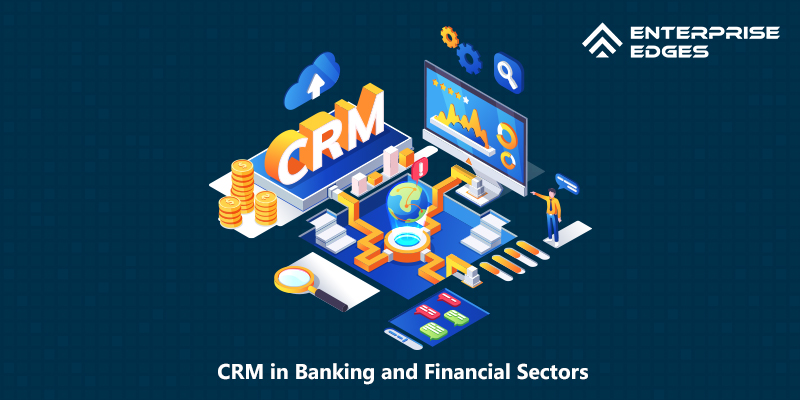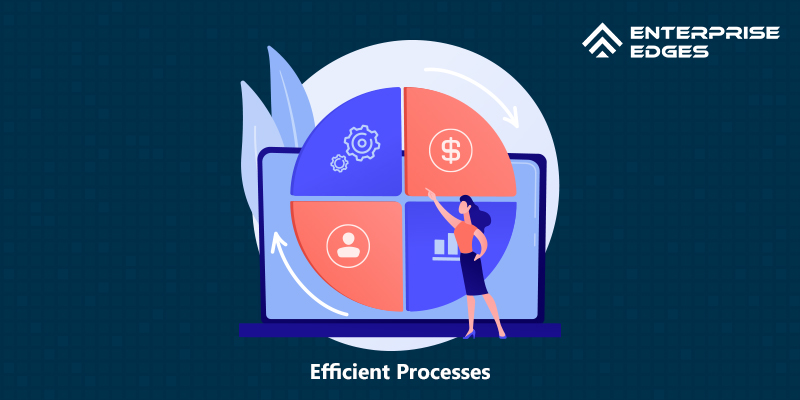In this digital era, many financial services organizations, including banks, insurance companies, and capital markets find it difficult to meet the rising customer expectations. The customers have fully embraced the convenience of Digital Financial Services (DFS). From loan application to debit card renewal, customers have become accustomed to DFS for every possible financial operation.
Apart from customer demands, the ever-increasing competition has compelled banks and other financial institutions to enrich their customer relationship experience. CRM provides a modern, customer-centric approach to service that helps gain a competitive edge and win more business.
What is CRM in Banking and Financial Sectors?

Customer Relationship Management (CRM) in the finance industry helps manage customers and better understand their needs to provide them with the right solutions. CRM system comprises three elements: operational, collaborative, and analytical. The operational element is concerned with the collection of customer data into a database that can be accessed and updated whenever a customer interacts with the company. The collaborative element allows the tracking and management of client communication done via e-mail, telephone, etc. Lastly, the analytical element uses the customer data and produces inferential reports and statistics about individual customers.
Implementation of CRM in the banking sector involves the development of bank-specific software solutions and a full makeover of business processes to align with the CRM solutions. While CRM implementations require large investments, its ROI is satisfactory.
Key Features of CRM in Banking and Financial Services
1. 360° View of Every Customer
CRM in banking and financial services acts as an integrated system that collaborates with other software programs to provide a single view of every customer account. From withdrawing money at an ATM to requesting the issuance of a demand draft, the CRM system records all the transactions.
This enables financial advisors and bankers to gain quick and deeper insights into customer’s habits and personal preferences. This can help in introducing products and services to align with customer’s financial goals.
2. Interaction Tracking
![]()
Banks need to rely on previous communications to maintain a trustworthy relationship with their customers. Interaction history allows storage and access of customers’ behavior on the website, mobile app, chats, calls, and interactions with sales representatives. This allows managers to track specific products and services and customer retention.
3. Automation, analytics, and forecasting
CRM’s automation, analytics, and forecasting abilities help in developing effective sales and marketing strategies. Automating tasks such as outgoing calls and follow-ups can optimize sales processes. This allows sales reps to work on more important tasks like assessing sales analytics based on customer surveys, polls, and social media campaigns to determine which customers are more likely to convert.
Similarly, CRM systems enable marketing automation and forecasting, leading to better strategies and initiatives with improved metrics. With the help of CRM, marketers can evaluate the effectiveness of campaigns, conversion rates, and new market opportunities.
4. Integration
Financial CRM systems can be integrated with social media, automated platforms, and third-party services. This feature is effective in improving market communications. E.g. launching email campaigns by integrating email marketing services.
Benefits of CRM in Banking and Financial Sectors
1. Improved Customer Retention
Banking and other financial CRM solutions make a great deal of data available at your fingertips, which can deliver highly customized services to customers. Customer records and personal notes can significantly enhance customer experience. For instance, if a teller adds a note to the customer profile stating they were inquiring about a certain type of loan, the loan department can send a follow-up email with helpful resources. It promotes loyalty and improves customer retention.
2. Efficient Processes

CRM is a single, unified system that enables any employee to access customer profiles and make real-time updates to them. This distributed system eliminates duplicate conversations while understanding the customer’s situation and requirements. Also, CRM’s automation and analytics speed up various business processes.
3. Revamped Sales and Marketing Strategies
The CRM data can be compiled into meaningful insights that can gain you a much deeper understanding of your customers. This can help identify trends and anticipate customer needs so that you know where to direct your future marketing and sales efforts. Also, the specific areas from customer profiles can be used for upselling and cross-selling.
4. Increased Productivity

A CRM system gathers all the client information under one platform, so there’s no need for employees to search through emails and multiple platforms for accessing specific data. Such repetitive tasks are eliminated so that employees spend less time scouring through data. The employees can utilize their remaining time to foster customer relationships.
Conclusion
CRM solutions have become quintessential for the finance industry because of the growing customer expectations. While banking and financial sectors require addressing the individual needs of their customers, those equipped with CRM solutions are bound to win customer trust. Adoption of CRM in the banking sector will ensure that your customers are served right at every point of the sales funnel.
